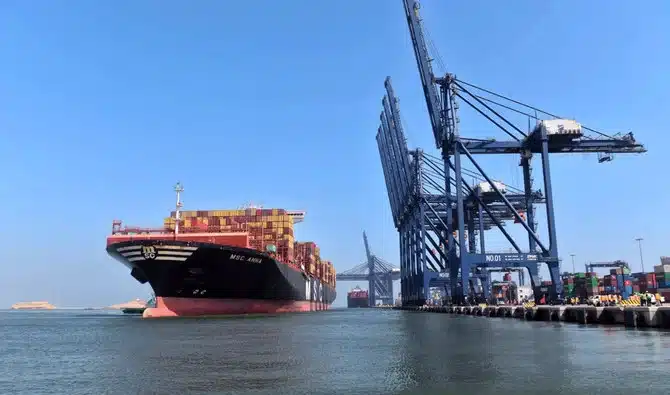The Pakistani maritime affairs minister said on Thursday that Pakistan will sign a $2 billion investment deal with a European shipping firm. The agreement is expected by October this year. This comes amid growing global interest in Pakistani ports.
The statement came weeks after AP Moller–Maersk (Maersk) Chief Executive Officer Keith Svendsen visited Pakistan. During his visit, he met with top officials to explore opportunities in Pakistan’s maritime sector.
On Thursday, Maritime Affairs Minister Qaiser Ahmed Sheikh made a statement. He said the European shipping firm would invest in logistics and infrastructure at the Karachi Port Trust (KPT).
“A well-known European company has shown interest in investing $2 billion in Karachi Port Trust,” Sheikh said, without naming the firm. “The company is expected to sign the memorandum of understanding by October.”
Sheikh said the European firm also intended to set up a shipbreaking project in Pakistan.
He told Arab News this month that Danish shipping giant Maersk plans to invest in a terminal and port in Pakistan. The investment also includes allied infrastructure, such as connecting bridges.
“We had very good discussions with them and they had shown eagerness and told us that they will submit proposal in a few days,” he said on May 7. “They want to take a terminal. There is some area where there is depth in the sea, where big ships can be anchored.”
Maersk as a Leading Logistics Provider
Maersk has grown into a leading provider of logistics and supply-chain services across Pakistan. It has around 20 percent market share in Pakistan’s containerized import-export activities, according to Pakistan’s information ministry.
In January, the Danish shipping firm announced new smart logistics and warehouse facilities in China, Norway and Pakistan.
“With a vast network of warehousing and depot facilities across the country, including our flagship logistics hub in Port Qasim, Karachi — a sprawling 27-acre complex encompassing over 650,000 square feet of warehouse space — we ensure unparalleled support to Pakistani exporters and importers,” the shipping company said in a written response to Arab News.
“In total, Maersk now operates over a 1.5 million square feet footprint across 7 cities in Pakistan.”
The South Asian nation has already signed an agreement with Abu Dhabi (AD) Ports Group. This agreement involves an investment of about $395 million. The funds will be used for developing a container and cargo terminal. The agreement is a government-to-government (G2G) arrangement between the United Arab Emirates and Pakistan.
This news is sourced from Arab News and is intended for informational purposes only.


![Afghan men search for victims after a Pakistani air strike hit a residential area in the Girdi Kas village, Nangarhar province on February 22, 2026. [Aimal Zahir/AFP/Getty Images]](https://southasiatimes.org/wp-content/uploads/2026/02/gettyimages-2262391441.webp)



